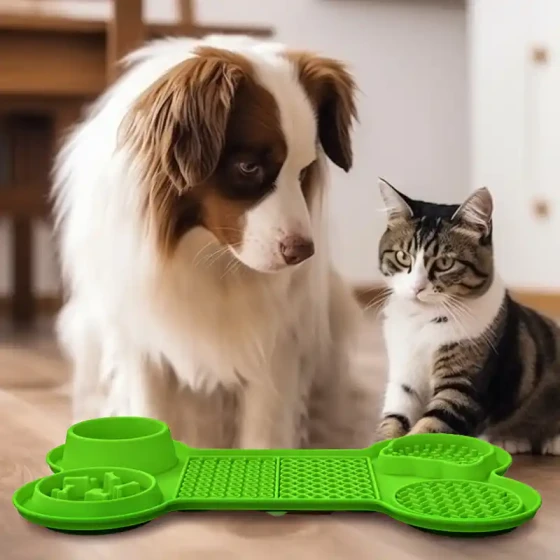Eggs, Duck Eggs, Fried Eggs_Pet Nutrition Complete Guide
Can pets eat chicken eggs, duck eggs, or even “fried eggs”? This is a question many pet owners care about since eggs are a common dish on our tables, nutritious and affordable, so naturally, they wonder if they can share some with their furry children. To conclude: the vast majority of healthy cats and dogs can consume a moderate amount of fully cooked chicken or duck eggs (egg only), but raw eggs and any form of “fried eggs” must be strictly avoided. Although this seems simple, it actually involves many aspects of pet nutrition.
Let’s first discuss why chicken eggs and duck eggs can be fed to pets and what they provide. From a nutritional perspective, eggs (especially the white and yolk) are considered representatives of “perfect protein.” Their amino acid composition is very balanced and easily absorbed by animals. For our cats and dogs, this means a high-quality protein source that helps build and repair muscle tissue and maintain bodily functions. Besides protein, the yolk is a “nutrition treasure chest,” rich in fat-soluble vitamins A, D, E, K, B vitamins, iron, selenium, phosphorus, and lecithin, which benefit skin and coat health, making the fur smoother and shinier.

But here comes the question: why emphasize “fully cooked”? There are several key points:
- Biotin Deficiency Risk (Biotin Deficiency): Raw egg whites contain a substance called “avidin,” which binds biotin (Vitamin H), preventing pets from absorbing this important B vitamin. Biotin is crucial for healthy skin, hair, and nails (claws). Eating small amounts of raw egg whites occasionally may not be problematic, but long-term or large-quantity raw egg white feeding theoretically poses a risk of biotin deficiency. Heating, i.e., fully cooking, deactivates avidin.
- Food Safety Hazards: The surface or interior of raw eggs may carry bacteria, the most common being Salmonella. Humans may suffer diarrhea and fever after ingestion, and pets can also catch it, especially young or elderly pets with weaker immune systems. Fully cooking is the most effective way to kill these potential pathogens.
Therefore, the safest and most recommended way to feed pets eggs is fully cooked. It can be hard-boiled eggs (chopped or mashed), plain poached eggs without oil or salt (just water-poached, no seasoning), or scrambled eggs cooked with a little water or unsalted broth. Remember, any extra seasoning such as salt, sugar, soy sauce, or even onions and garlic (toxic to pets), absolutely! must! not! be! added!
Which is better, yolk or white? Actually, both have their merits, and eating both together is ideal. Egg white mainly provides protein and is low in fat; yolk contains relatively more fat but has more vitamins, minerals, and lecithin. If your pet needs to control fat intake (e.g., history of pancreatitis or prone to diarrhea), you may need to limit yolk intake, but for most healthy pets, whole eggs provide more comprehensive nutrition.
Now, about duck eggs. Duck eggs are nutritionally similar to chicken eggs, containing protein, vitamins, and minerals. However, duck eggs are usually larger, with a higher yolk proportion and generally higher fat and cholesterol content than chicken eggs. This means duck eggs have a higher energy density. For some small dogs or pets sensitive to fat, feeding duck eggs may require smaller or less frequent amounts compared to chicken eggs. Likewise, duck eggs must be fully cooked before feeding for the same reasons as chicken eggs.
We must specifically criticize “fried eggs.” Here, “fried eggs” usually refers to pan-fried eggs, especially those cooked with oil and possibly sprinkled with salt or other seasonings. Fried eggs are absolutely unsuitable for pets!
- Excessive Fat: Frying eggs requires oil, whether vegetable or animal oil. Extra fat intake burdens pets and can cause digestive upset, leading to vomiting and diarrhea. Long-term high-fat diets may trigger obesity, pancreatitis, and other health problems. Pets already receive the fats they need from their regular food, so adding more fat is unnecessary and potentially harmful.
- Seasoning Risks: We tend to add salt or other seasonings to fried eggs to enhance flavor, but these are forbidden for pets. Salt strains the kidneys, and other spices may irritate the gastrointestinal tract or even cause poisoning (e.g., onion powder, garlic powder).
- Cooking Methods: High-heat frying alters the food structure, producing substances harmful to pet health.
So, when you enjoy a fragrant fried egg yourself, please control your hand and don’t share a piece with your eagerly watching pet. Loving them means giving them the food best suited for them.
To summarize the “operating guide” for feeding pets eggs:
- Can they eat eggs? Most healthy cats and dogs can eat cooked chicken or duck eggs.
- Raw or cooked? Must be fully cooked! Say no to raw chicken or duck eggs for safety and nutrient absorption.
- Can they eat “fried eggs” (pan-fried)? Absolutely not! The oil and seasonings in fried eggs are hidden dangers to pet health.
- How much? Eggs should be treats or nutritional supplements, not staple food. Amounts should be controlled. A common rule is treats should not exceed 10% of the pet’s daily calorie intake. The number of eggs depends on the pet’s size, activity level, and daily food calories. For example, small dogs may be fine with half or one cooked egg per week, while large dogs can have somewhat more. It’s best to chop and mix with the regular food or give alone as a reward.
- First try: Give a small amount at first, observe for vomiting, diarrhea, or skin itching. If none appears, slightly increase next time.
- Special cases? Some pets may be allergic to eggs (though rare) or have underlying conditions such as kidney disease, hyperlipidemia, or pancreatitis. If your pet has special health issues, consult a vet before adding any new food.
Of course, the most worry-free and scientific source of pet nutrition is still the complete pet foods formulated by veterinary nutritionists and compliant with AAFCO or other authoritative standards. These foods contain all necessary nutrients in balanced proportions to meet pets’ daily needs. The eggs we feed additionally are more of a high-quality treat or supplement during specific periods (such as recovery or weight gain).
After all this, the main message is that giving pets “extra meals” is a science and not simply “whatever we eat, share a bit.” Even a small egg hides both health benefits and risks. Used correctly, it’s a nutritional helper on your pet’s table; used wrongly, it may backfire. So next time you want to give your furry child something different and think of eggs, please choose the safe and healthy “water-boiled egg” mode. Leave those greasy, fragrant “fried eggs” to enjoy yourself. After all, their health is our most precious treasure.


